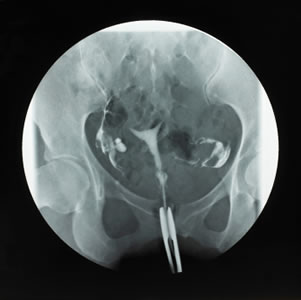Female Fertility Testing
Preliminary Infertility Screening Tests

The physicians at the Fertility Institute of Hawaii utilize the results of several diagnostic tests to help personalize your treatment plan. These tests are designed to look for problems that could have an adverse impact on your infertility treatment or subsequent pregnancy. If you have had any of the tests listed below within the last 6 to 12 months, please make the results available to your nurse or physician. Depending upon the test, you may not need to have the test repeated immediately prior to your cycle. Depending upon the type of therapy planned, some tests may not need to be done.
Female Testing
Blood Tests
-
- FSH / LH / Estradiol: This combination of FSH (follicle stimulating hormone), LH (luteinizing hormone) and estradiol drawn early in the menstrual cycle is a reflection of the female partner’s ability to respond to stimulation (ovarian reserve). These tests will help to determine which procedures and protocols are most appropriate for fertility treatment.
- AMH (Anti-Mullerian Hormone): A hormone produced by the ovarian follicles, Anti-Mullerian Hormone (AMH) can be tested to check ovarian function. A low AMH level may indicate problems with ovarian function
- Infectious Screen: (chlamydia, hepatitis, syphilis, HIV, gonorrhea): Having one of these infections could adversely affect the outcome of your procedure or your pregnancy should you become pregnant. Many people have already been screened by their OB/GYN or primary care provider.
- Pregnancy Screen: (Blood type and Rh Factor, Rubella titer, Varicella titer, complete blood count). Determining Blood type can be helpful if there are problems with a pregnancy. Varicella and Rubella are infections that may cause birth defects. Most people have been immunized already. However, some people have not been immunized or they are no longer immune. These tests determine if any additional vaccines are needed prior to pregnancy. A complete blood count screens for anemia and other blood disorders and can indicate certain inherited disorders.
- Prolactin, TSH: These hormonal tests screen for subtle abnormalities that could affect your treatment or your pregnancy. Both hormones are made by the pituitary gland in the brain. Prolactin is a hormone that helps to stimulate milk production during breast-feeding. Some women will secrete too much prolactin when not breast-feeding potentially affecting fertility. TSH (thyroid-stimulating hormone) is the most sensitive test of thyroid function. It can detect either over activity or under activity of the thyroid gland.
- Genetic Carrier Screening: ACOG recommends that ob-gyns make DNA screening for cystic fibrosis and other genetic diseases available to all couples seeking preconception or prenatal care.
Uterine/Fallopian tube testing
 After ovulation each month, an egg travels from the ovary into one of the fallopian tubes, where it can be fertilized by sperm. The early embryo then travels through the tube into the uterus where implantation occurs. Any damage or scarring surrounding the fallopian tube can hinder this process. Your doctor may order a test to evaluate the patency of the fallopian tubes. There are two types of tests that can be done to evaluate the fallopian tubes.
After ovulation each month, an egg travels from the ovary into one of the fallopian tubes, where it can be fertilized by sperm. The early embryo then travels through the tube into the uterus where implantation occurs. Any damage or scarring surrounding the fallopian tube can hinder this process. Your doctor may order a test to evaluate the patency of the fallopian tubes. There are two types of tests that can be done to evaluate the fallopian tubes.
- Hysterosalpingogram (HSG)
- This test utilizes an x-ray to determine if one or both fallopian tubes are open.
- How the test is performed: A speculum is placed in the vagina to allow visualization of the cervix. A small catheter is placed through the cervix and into the uterus. A dye is then pushed through the catheter while X-rays are taken. If the fallopian tubes are open, dye will fill the tubes and spill into the pelvis without difficulty.
- What to expect during the test: You may experience some cramping and discomfort during the procedure. Any discomfort usually lasts for a few moments and goes away after the procedure. You can take ibuprofen or Tylenol prior to the test to help with the discomfort.
- How is the test interpreted: This test is done in the hospital’s radiology department. It is done by a radiologist who will send a report of the results to your doctor.
- Hysterosalpingo-contrast-sonography (HyCoSy)
- This test utilizes an ultrasound to determine if one or both fallopian tubes are open.
- How the test is performed: A speculum is placed in the vagina to allow visualization of the cervix. A small catheter is placed through the cervix into the uterus. A sterile contrast agent is pushed through the catheter while an ultrasound is performed. The contrast agent is typically saline mixed with a small amount of air or a sterile foam. This helps the provider observe the uterine cavity and tubes with the ultrasound.
- What to expect during the test: You may experience some mild cramping and discomfort during the procedure. Any discomfort usually lasts for a few moments and goes away after the procedure.
- How is the test interpreted? This test is done in the clinic at FIH by one of our providers. The results will be given to you at the time of the visit.
- Benefits to HyCoSy: The benefits include no exposure to radiation, no need for iodine-based contrast, and less discomfort compared to HSG utilizing X-ray. Although the Fertility Institute of Hawaii offers this test, there are some instances where an x-ray based HSG may be more appropriate. Speak to your provider as to what is best for you.